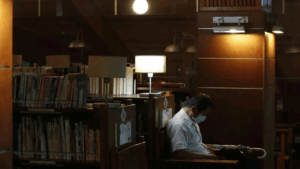 For some years now I have worked with and on behalf of people who are unhoused. First as the director of a church ministry, and presently as a board member of a small non-profit. It has been my privilege to hear the stories of some of the people that I have served. There is one story in particular that stays with me.
For some years now I have worked with and on behalf of people who are unhoused. First as the director of a church ministry, and presently as a board member of a small non-profit. It has been my privilege to hear the stories of some of the people that I have served. There is one story in particular that stays with me.
An Unsettling Awakening
Once, at 3am, several unhoused people were asleep in a public space in their town. I say their town because that’s what it was for them. In the absence of any permanent shelters in the town, and few in the surrounding area, they found shelter during the day in the town’s public library. They relied on several of the churches in town for food, clothing, and other assistance. Most importantly they had formed relationships, both with other unhoused people and housed members of the community who had come to care about them, offering them friendship and support.
To the extent that their unhoused status would allow them, they felt safe and at home in the town. But on this occasion, at 3am, the police did a sweep of the public space where people were sleeping. They enforced an urban camping ordinance that was “on the books” but inconsistently enforced. People were awakened and told: “You can’t sleep here.” Some of the unhoused angrily asked where they were supposed to sleep. According to the women who told me the story, the police replied that they were not welcome in the town and should leave permanently.
Unhoused People Are Not the Problem
While I don’t know what precipitated this sweep, I do know that the problem of homelessness is too often conflated with the people who are unhoused. The problem of homelessness stems from the lack of affordable housing in our communities. Homelessness stems from the income inequality that exists in our nation. Homelessness stems from mental health and other supportive services being woefully inadequate to the need. These problems will not be solved overnight, and waking people up and threatening them in the middle of the night does nothing to solve the problem of homelessness.
Welcoming Unhoused People
In contrast to the sweep, how can we, both ourselves and our churches, become more welcoming to and supportive of people experiencing homelessness? How can we incarnate our baptismal vow to “respect the dignity of every human being” (BCP 305)?
At my church we give out lunch bags with nutritious food. I am proud that the lunches are given out with friendliness and kindness. Yet, I find myself wondering how we might invite those who come for a lunch to participate in the ministry: to help make the lunches, give them out, and help with clean-up. Not everyone who comes will wish to participate, but being invited is in itself an act of respect. How else might we invite unhoused people into the life of our parishes? And how might we, all of us, reach out and join people who are unhoused in their journey out of homelessness?
To learn how the Episcopal Community Foundation can support your parish in welcoming unhoused people, please contact our Executive Director.

